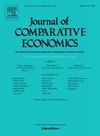Diplomatic relations and agricultural trade
IF 3.1
2区 经济学
Q1 ECONOMICS
引用次数: 0
Abstract
Political conflicts often cause disruptions in agricultural trade, yet previous studies have not paid much attention to the food market. Focusing on China, this paper examines the impact of diplomatic relations on agricultural trade. We match a panel dataset on agricultural exports to China from 168 trading partners with our constructed ranking index of diplomatic relations. Using different strategies to address the endogeneity issue, our analysis finds robust evidence for a strong and positive effect of diplomatic affinity on bilateral agricultural export flows. Exploring the potential mechanisms, we uncover that the increased agricultural exports work primarily through enhancing bilateral communication. Based on a quantitative trade model with Stone-Geary preferences, we then quantify the welfare effects from changes in diplomatic relations. We show that an increase in the ranking of diplomatic relations with trading partners leads to welfare gains of 0.5-1.8% through agricultural trade.
外交关系和农业贸易
政治冲突往往会导致农业贸易中断,但以往的研究并未对粮食市场给予太多关注。本文以中国为研究对象,考察外交关系对农业贸易的影响。我们将168个贸易伙伴对中国农产品出口的面板数据集与我们构建的外交关系排名指数相匹配。通过使用不同的策略来解决内生性问题,我们的分析发现了强有力的证据,表明外交亲和对双边农业出口流动具有强大而积极的影响。通过对潜在机制的探讨,我们发现农业出口的增加主要是通过加强双边沟通来实现的。基于Stone-Geary偏好的定量贸易模型,我们量化了外交关系变化带来的福利效应。我们表明,通过农业贸易,与贸易伙伴的外交关系排名的提高会带来0.5-1.8%的福利收益。
本文章由计算机程序翻译,如有差异,请以英文原文为准。
求助全文
约1分钟内获得全文
求助全文
来源期刊

Journal of Comparative Economics
ECONOMICS-
CiteScore
4.40
自引率
0.00%
发文量
66
审稿时长
45 days
期刊介绍:
The mission of the Journal of Comparative Economics is to lead the new orientations of research in comparative economics. Before 1989, the core of comparative economics was the comparison of economic systems with in particular the economic analysis of socialism in its different forms. In the last fifteen years, the main focus of interest of comparative economists has been the transition from socialism to capitalism.
 求助内容:
求助内容: 应助结果提醒方式:
应助结果提醒方式:


